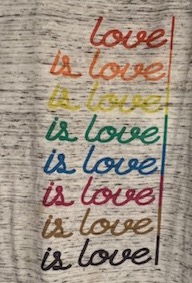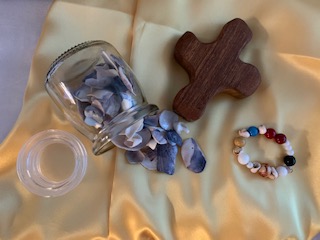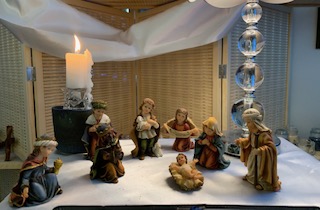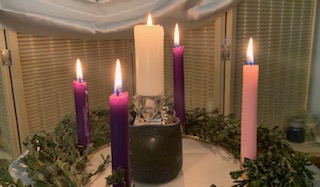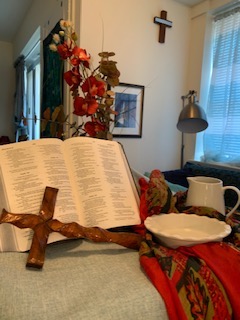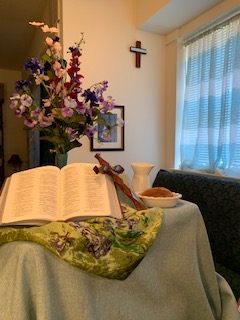
Psalm 126
What are your dreams? How did they come about? Do they arise out of hopes for the future, life events that are anticipated and celebrated, or do they arise out of grief and deep longing for change?
There are many ways that we come to find our dreams, to name them and to hope for joy and to find it as we live life’s journey.
In our series on Being the Church we have named many concerns. We have considered the many who experience poverty of substance and spirit, those who outcast by reason of racism. We have looked at the idea of environmental justice and the future of the planet, thought of those who have little power, whose voices are not heard and respected, those for whom one or more of their demographic descriptors often sets them apart subject to rejection in the community at large.
Today is Pride Sunday in the Lehigh Valley. It is a day to honor those who struggle and are excluded because of their sexual orientation or gender identity. It is a day for us to celebrate with them, and to help them find joy in being and to the new freedoms they have found. As I speak, people are beginning to gather for ecumenical service later this morning which will affirm God’s love for these our siblings. In the afternoon many others will join them to celebrate and offer information to all who have questions on matters of faith, health, and many other local and social concerns in the public square. As at most fairs; music, food, and crafts are part of the festival. Covid precautions will be in effect for the entire event which takes place outdoors.
But for me, the most important part of the day is seeing the number of booths on what they call Faith Row. I will be there at the PNEC booth for awhile this afternoon. Each year the number of faith communities that take part in this event is growing. This year they emphatically echo the theme of this year’s Pride Day, You Are Included!!
So let’s consider where this church is in this conversation. Let’s think about the hopes and dreams of the LGBT community. Perhaps you remember that it was not that long ago that few churches stood beside the LGBT+ community.
In 2002, while I was still working as a nurse, I was approached by the pastor of my congregation who asked me to facilitate conversations on the Open and Affirming process in my home congregation. At that time only a few hundred churches in the UCC had done so. But as more and more people shared their story and reached out to friends and family who had courage to come out of the closet, the time was ripe to address how faith communities would respond.
Among the members of the church were a couple, women who had lived in my neighborhood since we moved there in the mid 70s. There were only two houses between us and for those 30 years they worked together at the university in the nursing department as professors and they had lived together as “roommates.” And there were others; a gay man who had taught history prior to his retirement, a couple of young women with aspirations for a family. There were some who had family members who identified as gay, lesbian, bisexual or transgender and knew the difficulty they faced each and every day. You see, often people we know are among those who are afraid to claim who they are for fear of rejection. So they come to churches, to celebrate their faith but they feel unable to bring their whole selves and name their reality.
And so we set out to consider the experiences and the dreams of LGBT folk. I’ll admit, I had questions, even reservations then. But I was willing to study and learn what the Bible, the scientific community, and personal story had to offer. I remembered the LGBT+ folks I had cared for in the hospital. I had witnessed their pain as they fought for recognition of their personhood and desired support from their family. Too often experienced the trauma of rejection when they most needed support. When they became ill from whatever cause, they were really and truly alone except for the support of the medical staff and a few close companions.
As I considered times when I had felt rejected or left out, as I studied Jesus’ teachings and actions that demonstrated love for everyone who approached him, I came to unconditionally agree that we needed to claim our acceptance and affirmation of all people.
It is true, some folks at first thought the conversation unnecessary. This was before the Still Speaking initiative and still people questioned, “Didn’t we after all welcome everyone who came?” But one event helped to move hearts and minds.
Rt. Rev. Gene Robinson was being installed as the bishop of the Episcopal church in NH, and the ceremony would take place in the sports arena of University of New Hampshire just a mile down the street. Another church in town, a conservative evangelical one, chose to host Fred Phelps and his church and family who came to protest and condemn Robinson and all LGBT folk, and it was not pretty.
The pastor put the question to us, “‘When we and this other church down the street both say everyone is welcome what does that mean?’ How are people to know that we will not condemn them and try to change them once they come in the door unless we stay it in terms that are very clear?”
And so I ask,” What do we mean when we say ‘No matter who you are of where you are on life’s journey, you are welcome here?’” What exactly do we believe and affirm, and how are people to know? Is it time, as we look to what we are becoming to ask the question? Should we as someone recently suggested study the idea and consider making a statement, craft one so that everyone will know? No matter who you are and where you are on life’s journey, you are welcome here. No matter your age or your race or your economic circumstances, or where you grew up, or what country you came from, and yes, what your sexual orientation or gender identity you are welcome here.
How might we express that we truly and completely affirm everyone? Let us consider the dreams of those who have felt left out as we strive to follow Christ’s call to Be the Church.
When the Lord restored the fortunes of Zion,
we were like those who dream.
Then our mouth was filled with laughter,
and our tongue with shouts of joy.
The Lord has done great things for us.
Ps.126:1,2a,3 NRSV

